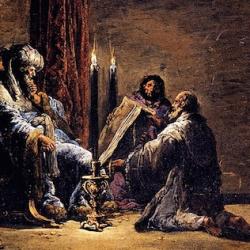1 Chronicles 22:6–16 records David’s hortatory speech to Solomon about building the temple. It is divided into two large sections, both marked by the phrase “my son” (22:7, 11). The first section repeats Yahweh’s oracle to David explaining why he would not build the house and promising that David’s son would build a house. Based on Yahweh’s commitment to Solomon, David exhorts his son to build. the exhortation is framed by a chiastic inclusio:
A. Yahweh be with you, 11a
B. Build the house, 11b
. . .
B’. Arise and work, 16b
A’. Yahweh be with you, 16c
Within this frame, David deals with two main concerns. First, He prays (or pronounces) that Yahweh would give Solomon wisdom to keep Torah (v. 12), which is the way of prosperity (see my earlier post on this). That section ends with a fourfold command: Be strong, be courageous; do not fear, do not be dismayed (v. 13). Second, in verses 14–16a, David reminds Solomon of the preparations he has made, assembling vast supplies (v. 14, listed in descending order of value, gold, silver, bronze, iron, timber, stone, from the inner sanctuary to the outer walls) and wise workmen (v. 15). Yahweh’s presence will make Solomon successful; but David makes preparations too. “Yahweh be with you” and “look at all the stuff I’ve gathered” are not incompatible.
The final verses of 1 Chronicles 22 record a brief speech of David to the leaders, an exhortation to help his son (vv. 17-19). After reminding them of the rest he has provided, he says (v. 19):
A. Set heart and soul seek Yahweh your Elohim.
B. Arise and build the sanctuary of Yahweh Elohim
C. to bring in the ark of the covenant of Yahweh
C’. and the vessels of Elohim
B’. into the house built
A’. for the name of Yahweh.
The chiasm goes down to word order: B has “build the sanctuary” while B’ has “house built.” “Yahweh” appears four times, “Elohim” thrice. The exhortation begins with the creation name Yahweh Elohim, a combination of the covenant name Yahweh and the more universal title Elohim. The two names interestingly split in the middle of the verse, Yahweh attached to the ark of the covenant and Elohim linked with other vessels. Yahweh of Israel is Lord of the four corners; altogether, God’s names are repeated a creation-week seven.
The shape of the text mimics the exhortation. In the outer layers, David refers to the “sanctuary” and “house” that are to built, but the interior verses name the objects that are in the interior of the house. Yahweh’s name is at the outer frame; the building of the house, where the ark and vessels are, is for the sake of God’s name and fame (cf. 22:5).
The exhortation is fundamentally not about building but about the “hearts” of the leaders. Perhaps the structure also implies a certain form of piety: As Israelites, the leaders wear Yahweh’s name, but they will succeed only if the throne of God is set up in their hearts, only if their hearts are devoted to worshiping Yahweh Elohim, Creator and Lord. The form of the text reminds Solomon and the leaders that they are dealing with a God who does not look on the outward appearance, but on the heart.















